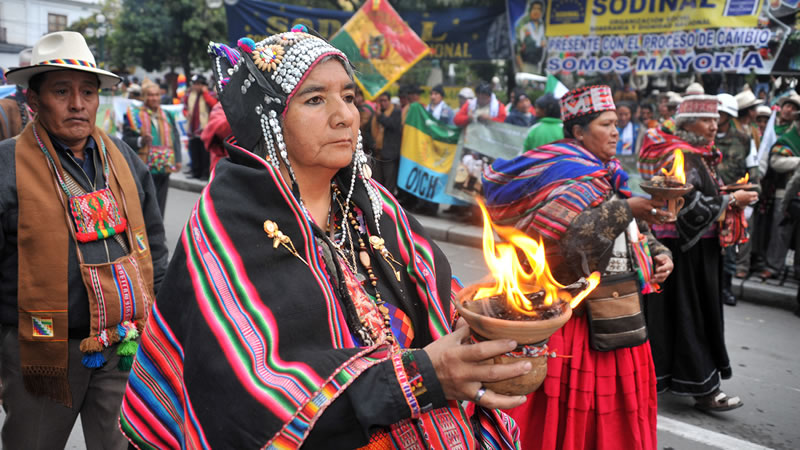Day of race? Indigenous resistance Day? Columbus Day? Too many names for the commemoration of this historical event. Why? Indeed the commemoration is not known in the same way throughout the continent, but it is not only that. In recent times there has been a resignification that completely changed the way in which we remember the arrival of Columbus in America.
Historically, the American continent remembers the first voyage of Christopher Columbus to America on October 12 of each year. While in the United States the commemoration bore his name Columbus Day, in Latin America and Europe it is known in different ways.
Argentina: Day of Respect for Cultural Diversity
Bahamas: Discovery Day or Discovery Day
Belize: Pan-American Day or Pan-American Day
Bolivia: Decolonization Day
Chile: Encounter of Two Worlds
Colombia: Columbus and Hispanic Day
Costa Rica: Day of Cultures or Day of Meeting of Cultures
Ecuador: Day of Interculturality and Plurinationality
United States: Columbus Day or Columbus Day
Guatemala: Columbus Day
Dominican Republic: Day of Identity and Cultural Diversity and also, Day of the Meeting between two Cultures, more than Day of the Race
Venezuela: Day of Indigenous Resistance
Bolivia, Honduras, Peru and Mexico: Columbus Day
Spain : Hispanic Day
October 12 is the official date of the Discovery of America by the expedition led by the Genoese sailor Christopher Columbus. However, said discovery is attributed to the Spanish Empire or Hispanic Monarchy because the imperial structure was not only the one that provided financing, but also the one that provided the available navigation technology. The kings Isabel I of Castile and Fernando II of Aragon opted for this company. The expedition was officially intended to seek a more direct route to the Southeast Asian East Indies without circumnavigating Africa and the Indian subcontinent, whose routes were in the hands of hostile Muslim powers and rival Portuguese trading posts.
This historical event is commemorated in a very different way today. While for many populations it represents a day of historical elevation, for others it represents a time of great darkness for humanity. The commemoration of the discovery of Christopher Columbus that gave rise to the colonization of the continent through the almost extermination of the natives, slavery and the abuse of hundreds of communities. The commemoration of a date that marks the enslavement of Africans who were trafficked and massacred in thousands for centuries is also criticized. For these reasons, the original communities have condemned the idolization of the figure of Columbus. On the other hand, the image of Columbus is claimed by the Italian community that migrated to the United States in the 20th century, since it served as a symbol of greatness and unity against the discrimination that many experienced when arriving in the United States.
The westernization of America ceases to be a matter of pride for members of native origin and instead researchers put on the table the genocide and invasion of American territory. Christianity begins to be seen as an imposition in the face of the destruction of local beliefs. Logically, the commemoration of this date cannot be seen in the same way. Even so, there is still room to promote the idea of “cultural syncretism” that means miscegenation between different cultures.

In Spain
In 1931 an article was published in the magazine ‘Acción Española’ where it defended the use of this term: “October 12 mistitled the Day of the Race, should henceforth be the Day of Hispanic Heritage”. With Franco’s victory in the civil war, the denomination Día de la Hispanidad or Fiesta de la Hispanidad became widespread in all official media. Legally, Hispanic Day was recognized in 1958 under a decree of the Presidency of the Franco Government.
Spain celebrates its National Holiday, although the date is associated with Columbus Day, both commemorations are not structurally linked. Reference is made in the explanatory memorandum to the historic event in which Spain, on the verge of concluding a process of construction of the State based on its cultural and political plurality and the integration of the Kingdoms of Spain into the same monarchy. Begins a period of linguistic and cultural projection beyond European limits, a way to commemorate the historical greatness of military campaigns abroad. All without taking into account the different perspectives on the historical events of the date.
:quality(70)/cloudfront-eu-central-1.images.arcpublishing.com/prisaradio/Q7J4W52GJNE4VDA74FZOJLC4QY.jpg)
Even so, this is a day of great importance for Western and world culture. It represents a discovery for the people who lived in Afro-Eurasia for cultures, civilizations, scripts, languages, technologies, products, crops, livestock, cities, riches, fauna and flora, good land, climatic conditions favorable to European and non-European. Also a population with a cosmology of very different power relations, as well as the meeting of two worlds that had evolved independently since the people of America. While it is true that crimes against humanity are a reality of these events, so is the historical, cultural and interconnection legacy between countries. In addition to being a holiday date which gives time and space for society to come together.
